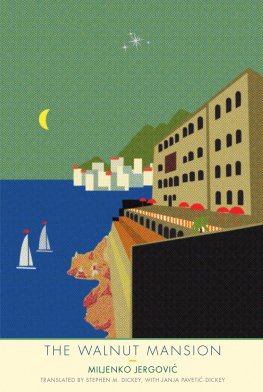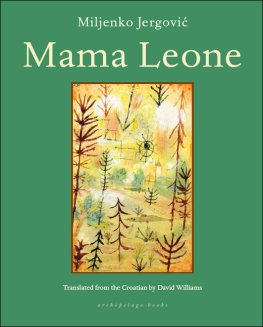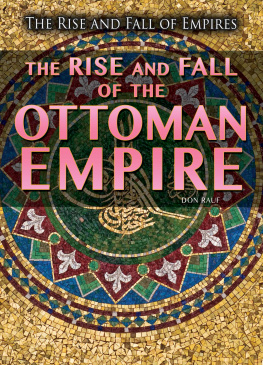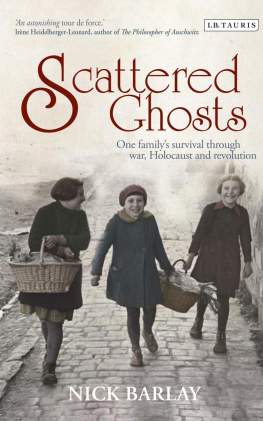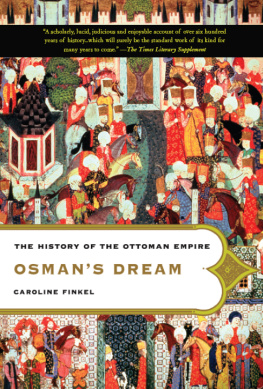Miljenko Jergovic
The Walnut Mansion
INTRODUCTION BY STEPHEN M. DICKEY
The Walnut Mansion, published in 2003, is the first novel by Miljenko Jergovi, one of the most well-known contemporary writers in Croatia and Bosnia. He has been a major figure in a wave of new realism that has been predominant in the fiction of younger writers of the former Yugoslavia since the breakup of the country. But Jergovis literary artistry is hardly limited to fiction: he has authored several collections of poetry, two collections of essays, three collections of short stories, and one novella.
The Walnut Mansion won the Bosnia and Herzegovina Writers Association Prize in 2003, and Jergovis other works have earned him numerous other awards. He received the Mak Dizdar Prize and the Goran Prize (both in 1988) for his first collection of poetry, The Warsaw Observatory; the Ksaver andor Gjalski Prize (1994) for Sarajevo Marlboro; the Matica Hrvatska Prize for Literature and the August enoa Art Prize for Buick Rivera (2002); the Premio Grinzane Cavour Prize (2003) for Mama Leone (1999); his novel Ruta Tannenbaum (2006) won him the Mea Selimovi Award for best novel of the year in Bosnia and Herzegovina, Serbia, Croatia, and Montenegro (2007). Most recently, he received the Angelus Central European Literature Award in 2012 for the Polish translation of his novel Srda Sings at Dusk on Pentecost.
If one judges according to output, literary awards, and the number of translations, Jergovi is one of the top two contemporary Croatian writers the other being Dubravka Ugrei. If Ugrei is better known among Anglophone readers, this is due in part to the fact that Jergovi has remained continually on the ground in Bosnia and Croatia, writing squarely for the local populations of Bosnians, Croats, and Serbs, a position that has resulted in fewer of his works being published in English translations. (Hopefully the present effort will help rectify this situation.) A further reason is that Jergovis tales are almost without exception situated within lands of the former Yugoslavia primarily in Croatia and Bosnia. They make almost continual mention of historical and cultural particulars of the region and therefore may seem more difficult to translate and less accessible to an outside readership. (Again, it is hoped that the present work will dispel at least the latter notion.) Indeed, it is this writers impression that Jergovi is the contemporary paradigm of a Balkan/Southeast European storyteller: he writes stories and novels replete with the charm and tragedy of the region that local and outsider alike simply cant put down.
Given his prolific oeuvre, Jergovi can only be described as very reticent concerning the details of his own biography; he provides the following statement on his website: Miljenko Jergovi was born in 1966 in Sarajevo. He currently lives outside of Zagreb.1 In addition to his literary activity, he works as a journalist for the Jutarnji list newspaper and is also a columnist for the Radio Sarajevo website and the Belgrade newspaper Politika. Since Jergovi grew up as a Bosnian and has lived and worked for twenty years primarily in Croatia, he is probably best conditionally (and for lack of a clearly better alternative) identified as a Bosnian/Croatian writer.2 (Note that ethnic identification has been no idle game in the former Yugoslavia and its successor states.)
Though The Walnut Mansion is Jergovis first novel, in its length and scope it arguably remains his most ambitious (though his latest novel, Kin, published in 2013, surely competes in this regard). It presents the authors vision of life in twentieth-century Yugoslavia, told through the experiences of a family from the Croatian city of Dubrovnik. In particular, it tells the story of a woman named Regina Delavale, whose life is tracked backward, from her death in 2002 as a demented ninety-seven-year-old woman to her birth in 1905. The chapters are even numbered in reverse, so that the novel begins with chapter 15 and ends with chapter 1. The focus of the novel is, in Jergovis words, a tale of the small in the greatthe momentous events of the twentieth century share the timeline with the failed romances, petty arguments, moneymaking schemes, traffic accidents, private obsessions, bedtime stories, jokes, lies, panicked mistakes, births, and all manner of deaths of the members and acquaintances of a common Dubrovnik family.
In all, episodes from five generations of Reginas family are narrated in the novel. It includes more than fifty characters and ultimately spans a period of more than one hundred years, taking place mostly in Croatia and Bosnia. It should therefore come as no surprise that in an interview with the newspaper Slobodna Dalmacija in 2003 Jergovi described it as an attempt at writing a quintessential novel.3 But if The Walnut Mansion has an epic scale, its epic is not the heroism of South Slavic tradition, but (as pointed out above) an epic of small, ordinary people. And it is in particular an epic of women, as the females are the central characters that provide continuity to the story. The central theme of the novel is how these women struggle and endure amid the fallout from the misfortunes and cataclysms (most notably the Second World War) that afflicted those living in the lands of the former Yugoslavia during the twentieth century.
If the references to the history of the region seem confusing to the uninitiated, it is for good reason. The lands of the former Yugoslavia have basically constituted a frontier zone where the cultures and legacies of the Byzantine (Orthodox), Ottoman (Islamic), and West European (Austro-Hungarian and Italian; Catholic) imperial traditions have coexisted, competed, and also fought throughout the modern era. Within the former Yugoslavia, Bosnia and Herzegovina Jergovis homeland has been the region where the interaction among these cultures has been the most intense and immediate.
The earliest events recounted in the novel occur in the waning years of the Ottoman Empire (the late nineteenth century). The Ottomans had conquered the Byzantine Empire and the medieval Serbian and Bosnian kingdoms basically by the mid-fifteenth century. The Croatian territories ceded their sovereignty to the Habsburg Empire in the hope of avoiding Ottoman conquest in the early sixteenth century; this strategy worked, but at the cost of Austro-Hungarian rule until that empire was dismantled following the First World War. This expansion of Austrian rule into Croatia, combined with the rule of the Adriatic coast by the Venetian Republic from the Middle Ages until Napoleons conquest of the latter, accounts for much of the historical context of the novel (and Austria-Hungary is mentioned much more frequently than one might expect in a novel about twentieth-century Yugoslavia). Further, the Treaty of Zadar compelled Venice to accept the establishment of the independent maritime Republic of Dubrovnik in 1358. The republic existed from that year until 1808, navigating alternating periods of trade, tension, and outright warfare between the Ottomans and their Austrian and Venetian opponents. The small Republic of Dubrovnik and thus its capital city were known for the value they placed on freedom and their independent spirit. One can arguably see some of that spirit in the actions of the characters in The Walnut Mansion. However, it is sometimes difficult to distinguish between the independent spirit of Dubrovnik and renowned Balkan stubbornness, and some might even argue that they are one and the same.
In the early modern era the territories of Croatia and Bosnia and Herzegovina became the locus of a static military frontier between the Austro-Hungarian and Ottoman Empires, a situation that contributed in large part to a frontier mentality and an ethos of resistance (to ideological commitment) to various outside players with an interest in the area. This spirit was conducive to various movements for national independence from the Ottoman and Austro-Hungarian Empires and, as an outgrowth, the idea of a pan South Slavic state Yugoslavia in the nineteenth century. Complicating such independence movements were actions taken by Austria-Hungary to fill the power vacuum left by the weakening Ottoman Empire, most notably the occupation and subsequent annexation of Bosnia and Herzegovina (1878 and 1908 respectively). As mentioned above, the introduction of Austro-Hungarian rule in the wake of the Ottomans forms the immediate historical background of the novel, which, however, is encountered only at its end.

